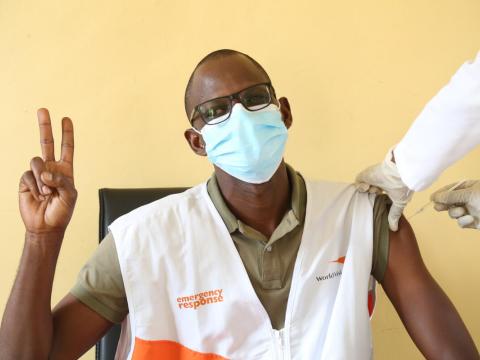
Finally, the end is in sight… or is it?
By Robert Kanwagi
Cargo deliveries are not the kind of thing that normally make national news. But in recent days, every first arrival of a COVID-19 vaccine cargo, whatever the country, makes it onto the front page. This week I posted on my church friendship group, a picture and article from a leading daily newspaper announcing the arrival of COVID-19 vaccines in Nairobi, Kenya. A friend responded to my message with a simple but powerful message: “Finally, we are hopeful we will get on top of this virus this year.” Like my friend, many people in the world’s poorest communities and countries are hopeful that the arrival of vaccines shows we shall overcome COVID-19.
I have had the privilege of working with a number of public health leaders across Africa, from the World Health Organization, UNICEF, national ministries of health, and other community service organisations, to review several national deployment vaccine plans. Across the continent, a lot of effort has gone into ensuring those countries that were the first hit by COVID-19 have received vaccines. COVAX deliveries started in late February, beginning with Ghana, Angola, Rwanda, Uganda, Senegal, Sudan, Lesotho, and Malawi. By the end of March, every country should have received their first deliveries, including Chad, Swaziland, Sierra Leone, and South Sudan.
As the vaccines arrive, the attention will shift from the TV and daily newspapers to the communities and people where hope had been lost but has now been re-ignited. In many ways, the hard part is just beginning. The greatest challenge now is getting the most vulnerable and at-risk people to have their first dose jabs.
World Vision is at the forefront of supporting and working with local governments and health ministries to educate communities about the benefits of vaccination and to be a voice for them, should we see them missing out on vaccines. We believe strongly that vaccines must be equitably shared and aimed at those groups that are most vulnerable. Vaccine inequities can arise at the distribution, selection, and administration phases of vaccine roll-out, so having accountability at every stage of the process is extremely important.
One of things I love about working here is World Vision is in a position to bring local conversations around vaccine inequity and hesitancy to the global stage to ensure all are treated fairly. We can’t neglect or forget those people who can be invisible, including those who are displaced, refugees and people who are unregistered in health systems. We will do this by partnering with other local-level organisations, faith leaders, and civil society to champion COVID-19 prevention and vaccine acceptance.
The greatest risk going forward is for those for those blessed to be in positions of power and influence to fail to improve the lives of the least served. They have two priorities:
- increased funding for vaccine production
- funding intentionally set aside to promote community acceptance interventions.
While health workers focus on putting the needles in arms, World Vision’s role is in getting the arms to the needles. There is hope in communities, but there is also hesitancy, and this must be addressed to get on top of the pandemic.
I worked on combatting Ebola in West Africa. I have since taken the Ebola vaccine. Now I look forward, when my time comes, to getting the COVID-19 vaccine. What is your individual role in supporting the global roll out of vaccines? It may be as simple as encouraging nervous friends and family to take it. You must determine your course of action.
What I am sure of is that vaccines are bringing hope. We are witnessing a global reduction in COVID-19 cases in countries where vaccinations are already happening. It is one year since the declaration of the pandemic. Hope is the medicine that keeps the vulnerable going, but it is also a partner in recovery. Let 2021 be the year of the vaccine and of hope flourishing.
Robert Kanwagi is World Vision’s Director of Vaccine Deployment & External Engagements, and sits on a COVAX working group.